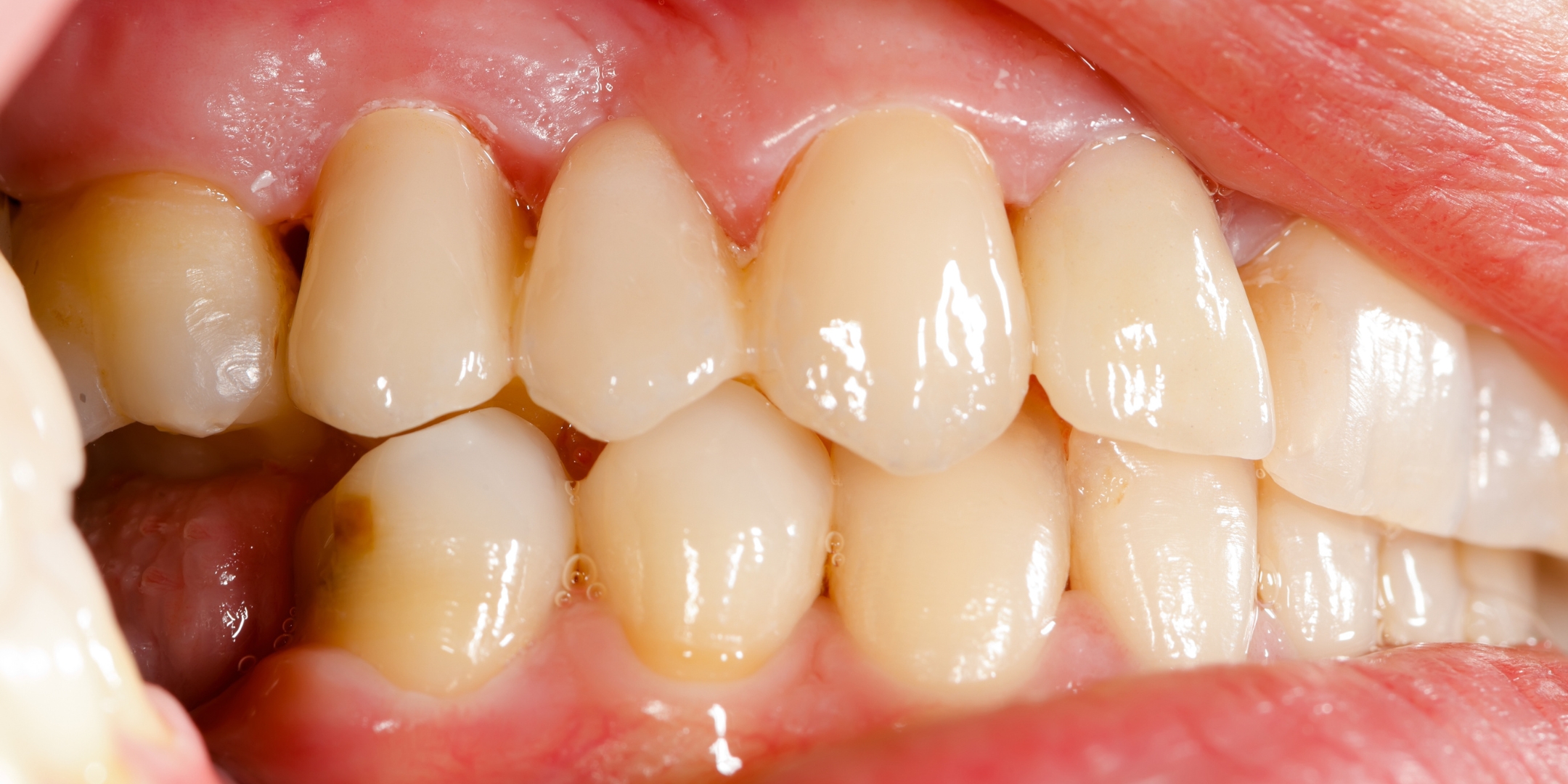- Malnutrition from eating disorders can lead to other debilitating conditions, such as osteoporosis.
- Eating disorders can inhibit salivation, the body’s number one defense against acid erosion.
- Some treatments for anorexia may also negatively impact the teeth.
- Brushing immediately after meals could do more harm than good.
According to the National Association of Anorexia Nervosa and Associated Disorders (ANAD), no fewer than 30 million people in the United States have an eating disorder.
Dental decay and oral health concerns are among the many issues that stem from anorexia and bulimia. Here we explain the impact these two conditions have on the teeth and mouth, and what can be done to lessen the damage.
Anorexia Nervosa: Malnutrition and Your Mouth
Anorexia is a psychological disorder that causes individuals to fixate on their weight. Said individuals often see themselves as fat when they clearly aren’t, a phenomenon known as body dysmorphia.
Not eating enough will inevitably lead to malnutrition, which in turn increases the risk of developing periodontal disease. Periodontal disease, also known as gum disease, widens the space between the gums and the teeth. In the end, teeth are likely to decay and fall out. This may also lead to osteoporosis, a disease that makes bones weak and brittle.
Furthermore, individuals with anorexia nervosa may be prescribed medications to help combat the impact this eating disorder has on the body. Sufferers are commonly advised to take dextrose tablets and sucrose drinks containing Vitamin C. But while these medications may treat certain problems, they can also increase acid erosion and tooth decay.
The road to recovery for those with anorexia is a long one. Unfortunately, the mouth won’t wait. It can be negatively affected by both the condition itself and some of the treatment methods. It’s essential that those suffering from the disease practice good oral hygiene in order to give their teeth a fighting chance.
Bulimia: The Impact of Binging and Purging
Similar to anorexia, bulimia nervosa is a psychological disorder with roots in body dysmorphia. However, while those suffering from bulimia also strive to control their weight, they go about it very differently.
Bulimia sufferers binge on large amounts of food, typically in one sitting, and then attempt to purge their bodies through self-induced vomiting. Purging can also involve the abuse of laxatives and exercising. This constant cycle of binging and purging eventually takes its toll on the heart, kidneys, and other organs.
Bulimia can also have serious repercussions on the teeth and mouth. Sufferers often binge on unhealthy, sugary foods, which cause cavities. The ensuing self-induced vomiting then brings gastric acid in contact with the teeth, which erodes them and leads to severe tooth decay and loss.
Understanding Oral Health Problems
If you’re struggling with one of these disorders, learn to recognize the signs that you are causing damage to your teeth.
Should you notice any of the changes listed below, you will need to speak with your dentist. You should also seriously consider taking steps towards finding support to overcome your eating disorder.
Gum Disease
Gum disease commonly occurs in two phases: gingivitis and periodontitis. Gingivitis usually begins with inflammation (redness, swelling, and bleeding) of the gums. When left untreated, gingivitis turns into periodontitis, causing irreversible damage to the structures that support the teeth.
Gingivitis isn’t always easy to detect in its earliest stages. If you suffer from an eating disorder and are concerned about your oral health, keep an eye out for a deep red shade to your gums and any bleeding when you floss.
Important nutrients like calcium, iron, and vitamins B and D are imperative for maintaining gum health. A lack of these nutrients, particularly calcium and the vitamin D needed to absorb it, can put you at risk of developing gum disease.
Although gum disease is seldom painful, in its advanced stages the teeth become mobile and gum infections frequently occur. As the gums recede, a condition exacerbated by the stomach acid from vomiting, the roots of the teeth become exposed. This can lead to extreme pain, infection and tooth decay.
Cavities
It’s common knowledge that sugary or acidic food and drinks like zfruit juices, sweets, and carbonated drinks are bad for the teeth. This sugar combines with the plaque in our mouths to create acid, which wears at our teeth, eroding the enamel in a process known as demineralization.
Saliva helps neutralize this acid. This process of remineralization helps to prevent damage to the teeth and usually takes about an hour. If your body doesn’t have time to complete this process before more binging occurs, the tooth will not have been restored to its healthy condition and a cavity may form on its surface.
A small cavity is typically nothing to worry about. It can easily be fixed by your dentist with a filling. However, untreated cavities grow and become painful. In extreme cases, the only solution is tooth extraction.
Gastric acid from self-induced vomiting can also contribute to tooth erosion, as gastric acid is particularly corrosive. Binging and purging hastens this process.
Yellowing or Brittle Teeth
We often don’t know that we have a cavity until it either hurts or the dentist catches it in a routine visit. However, there are some telltale signs of tooth erosion that you can keep an eye out for.
The texture and color of your teeth may begin to change. Yellow teeth indicate that the erosion of tooth enamel is worsening. This doesn’t mean you have a cavity, but it should be considered a warning sign.
Teeth may also take on a glass-like or smooth appearance as they become more fragile and brittle. This in turn can lead to jagged edges and tooth loss.
It’s worth reiterating that osteoporosis from malnutrition in those suffering from anorexia also contributes to tooth brittleness and eventual loss.
Mouth Sores
Gastric acid and sugary foods not only destroy the enamel on your teeth, but they can also cause painful sores in the mouth, throat, and gums.
These sores, also known as canker sores or mouth ulcers, can open and hemorrhage, leading to infection and no small amount of pain.
Typically there’s not much warning before a sore develops outside of a general soreness in the mouth. Once a sore develops, it’s important to seek treatment.
While the average person can often wait for a canker sore to heal itself, those who suffer from bulimia may not be able to resist the habits that led to the sore in the first place. In other words, the situation is bound to get worse unless you become proactive about it.
Swollen Salivary Glands and Dry Mouth
Gastric acid can also irritate the salivary glands on the inside of the mouth, causing them to become infected and swollen. Swollen glands are less likely to produce saliva, leading to dry mouth, or xerostomia.
As mentioned earlier, saliva protects teeth against decay by neutralizing acids and washing away bacteria. If your mouth can’t defend against these harmful elements, then the processes that lead to tooth decay, gum disease, and cavities will speed up.
Fortunately this isn’t a permanent condition. Once the infection is cleared up and the swelling reduced, the salivary glands should once again function as normal.
How to Protect Your Teeth
Eating disorders are difficult to overcome and can take many years of treatment. Don’t wait until you’ve beaten the condition to start working on your oral health.
While it may be difficult to resist the urge to binge and purge, there are things you can do to protect yourself from long-term damage:
- Brush your teeth two or three times a day. Make sure you’re using a fluoride toothpaste (1500 parts per million fluoride) and a medium bristled toothbrush. Fluoride is useful as it strengthens teeth.
- Use a fluoride mouthwash, but make sure you follow the manufacturer’s instructions. Some mouthwashes can be used daily while others are only recommended for use on a weekly basis.
- You should use interdental brushes and floss to make sure you’re cleaning between the teeth and below the gum line. Take your time and pay attention to how the gums feel.
- After binging, rinse your mouth with water or a fluoride mouthwash. When possible, you should brush your teeth before binging on sugary snacks or drinks. If you can’t, wait at least an hour after binging before brushing so you don’t interrupt the remineralization process.
- After vomiting, rinse your mouth as quickly as possible with either water or a fluoride mouthwash. This will minimize the effect gastric acid has on your teeth and mouth. You can also rinse your mouth with a solution of baking soda and water to neutralize stomach acid. Do not brush your teeth immediately as the acid weakens your tooth enamel and brushing can cause it to erode.
- Avoid brushing your teeth too hard. It’s tempting to tackle oral hygiene aggressively if you’re concerned about it. However, vigorous brushing can contribute to gum recession and the erosion of tooth enamel.
Even if you relapse, it’s important to forgive yourself and be practical and proactive with your oral health.
Talk to Your Dentist
Early detection of oral health problems is important. Visits to the dentist and other health professionals can be a vital part of treatment for anorexia, bulimia and other eating disorders. Make sure to keep up with your regular visits and keep an eye on any signs of gum disease, infection, and dry mouth.
Be honest with your dentist about your eating disorder. He or she can collaborate with other health care providers to coordinate dental treatment with other treatments. Your dentist can also provide you with tools and tips to help protect your teeth during your journey toward recovery.
For example, your dentist might supply you with a mouth guard to protect your teeth when you purge. He or she might also prescribe saliva replacements in the event you develop xerostomia, or a prescription-strength fluoride rinse to combat gum disease.
Your dentist may instruct you to wait before getting surgery to correct damaged teeth, depending on where you stand in your recovery process. Of course, recovery from eating disorders can be a very long process for some people. Have a frank conversation with your dentist about when they feel the right time for your surgery will be.
With commitment and support, there is light at the end of the tunnel. But at first, even though you may be healed emotionally, your body could still be struggling with the long-term impact of your eating disorder. Understand now what’s at stake and do everything you can to minimize the impact of this condition on your health.
Visit the National Eating Disorders Association for more information about treatment, health concerns, and where to find support.









